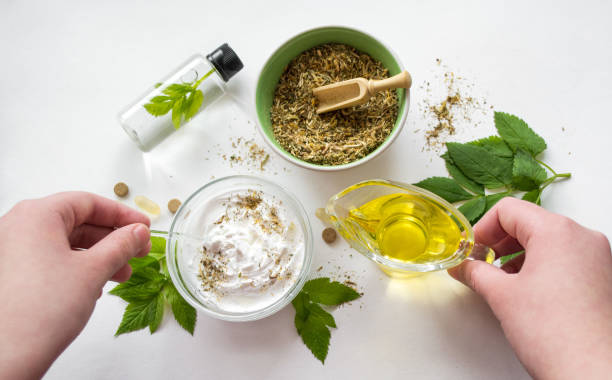
Say Goodbye to Hair Fall and Dandruff
Share
Natural Hair Care Solutions: A Full Look at Ayurvedic Treatments for Hair Loss, Thinning, and Flaky Scalp
Hair loss, thinning, and dandruff are common problems that affect men and women alike, often causing worry and lower self-esteem. Ayurvedic treatments provide natural, long-lasting answers to these everyday issues. Ayurveda can boost scalp health, feed hair roots, and encourage full, healthy hair growth by using proven herbs such as Amla, Bhringraj, and Aloe Vera. This complete guide will show you how to create and apply Ayurvedic hair oils, shampoos, and homemade hair masks for specific needs. We'll also look at diet changes and herbal supplements that can improve hair health from the inside out.
Understanding Hair Fall, Thinning, and Dandruff
Poor scalp health—hormonal imbalances, stress, or nutrient deficiencies—often cause hair fall and thinning. Dandruff, a condition where the scalp has flaky skin, results from dryness or fungal infections. While modern treatments exist, they often have chemicals that can irritate the scalp even more. Ayurvedic treatments offer a natural approach to addressing these issues. They aim to balance the body's doshas (Vata, Pitta, and Kapha), nourish the scalp, and revive hair follicles.
1. Amla: The Hair Strengthener
Amla (Indian Gooseberry) stands out as a top herb in Ayurveda for hair care. It's rich in Vitamin C, which helps Amla to make hair stronger from the roots, cut down on hair loss, and boost hair growth. What's more, it has properties that fight inflammation and act as antioxidants, stopping graying and dandruff. Amla is known to:
-
Boost Collagen Production: Amla contains lots of vitamin C, which has an impact on collagen production. This improves hair structure and makes hair follicles stronger.
-
Fight Dandruff: Amla's anti-fungal properties help to get rid of dandruff, itching, and dry scalp.
-
Stop Hair Thinning: Amla improves blood flow to the scalp. This leads to healthier hair growth and helps to prevent thinning.
How to Use Amla: You can create an Amla hair mask by combining Amla powder with water or yogurt to make a paste. Put this on your scalp and wait 30 minutes before washing it off. Another option is to rub Amla oil into your scalp to give it more nourishment.
2. Bhringraj: The King of Hair
Bhringraj (Eclipta Alba), also known as the "King of Hair," is a potent Ayurvedic herb with a long history of use to boost hair growth and reduce hair loss. This herb has an influence on hair health by feeding hair follicles, boosting blood flow to the scalp, and supporting overall scalp wellness. Bhringraj offers these perks:
-
Promoting Hair Growth: Bhringraj has an influence on hair growth. It stimulates hair follicles and extends the anagen (growth) stage of the hair cycle.
-
Preventing Hair Fall: This herb strengthens hair roots. As a result, hair becomes tougher and less likely to break.
-
Treating Dandruff: Bhringraj contains anti-inflammatory and anti-microbial properties. These help to fight scalp infections and cut down on dandruff.
How to Use Bhringraj: Bhringraj oil helps stop hair loss and thinning. Rub it into your scalp before going to bed and keep it on all night to give new life to your hair roots. You can also make a hair mask that feeds your hair by mixing Bhringraj powder with yogurt or coconut oil.
3. Aloe Vera: The Soothing Scalp Savior
Aloe Vera works as an all-purpose herb to hydrate soothe, and feed your scalp. Its enzymes fix dead skin cells on your scalp and stop dandruff. This plant also has an influence on balancing pH, which can help keep oil in check and make your hair glossy and moist. Aloe Vera offers these main perks:
-
Moisturizing the Scalp: Aloe Vera has a moisturizing effect on the scalp, which keeps it hydrated and helps to prevent dryness and dandruff.
-
Promoting Hair Growth: The enzymes in Aloe Vera help to fix damaged scalp tissues and wake up inactive hair follicles, which leads to new hair growth.
-
Balancing Scalp pH: Aloe Vera plays a role in keeping the scalp's pH in check, which cuts down on extra oil and slows hair thinning.
How to Use Aloe Vera: You can put fresh Aloe Vera gel right on your scalp as a calming mask. Let it sit for about 20 minutes before you wash it off with water. Another option is to mix Aloe Vera with coconut oil or essential oils to create a moisturizing hair treatment.
4. DIY Ayurvedic Hair Oils and Shampoos
You can make Ayurvedic hair oils and shampoos at home with these potent herbs. Here's how to create your own Ayurvedic hair care routine:
DIY Ayurvedic Hair Oil Recipe:
Ingredients:
-
2 tablespoons of Amla powder
-
2 tablespoons of Bhringraj powder
-
4 tablespoons of coconut oil
-
2 tablespoons of castor oil
Instructions:
-
Heat the coconut oil and castor oil in a pan on low heat.
-
Add the Amla and Bhringraj powders, and let the mixture simmer for 10 minutes.
-
Strain the oil and allow it to cool.
-
Rub this oil into your scalp and keep it on for at least an hour or overnight before washing it off with a mild shampoo.
DIY Ayurvedic Shampoo Recipe:
Ingredients:
-
2 tablespoons of Aloe Vera gel
-
1 tablespoon of Amla powder
-
1 tablespoon of Reetha (Soapnut) powder
-
2 cups of water
Instructions:
-
Get water boiling and mix in Amla and Reetha powders.
-
Let it cook on low heat for 15 minutes.
-
After it cools down, filter the mixture and blend in Aloe Vera gel.
-
Apply this natural shampoo to clean your hair. Rub it into your scalp and rinse well.
5. Herbal Hair Masks to Address Specific Problems
Ayurvedic hair masks offer a potent solution to tackle particular hair issues such as dandruff dry hair, and hair loss.
Hair Loss Mask:
-
Ingredients: Amla powder, coconut oil, yogurt
-
Instructions: Combine all ingredients to create a paste and spread it on your scalp. Keep it on for 30 minutes before washing it off. The amla and coconut oil will make your hair stronger, while yogurt provides moisture.
Anti-Dandruff Mask:
-
Ingredients: Aloe Vera gel neem powder, lemon juice
-
Instructions: Mix the ingredients and put the mixture on your scalp. Let it sit for 20 minutes, then rinse it out. This mask will moisturize your scalp and help to decrease dandruff.
6. Dietary Changes to Improve Hair Health
Ayurveda stresses the need for good internal health to care for your hair. Eating foods packed with vitamins and minerals that boost hair health plays a key role. Add these foods to your meals:
-
Leafy Greens: Spinach and kale have lots of iron, which helps hair grow.
-
Nuts and Seeds: Almonds, walnuts, and flaxseeds give you essential fatty acids that make hair stronger.
-
Protein: Hair is protein, so you need to eat enough protein from things like lentils, beans, and dairy.
-
Vitamin C: Amla, oranges, and lemons help your body make more collagen and strengthen your hair.
7. Herbal Supplements for Hair Health
Ayurvedic supplements like Triphala, Ashwagandha, and Brahmi boost overall health and make hair stronger from the inside out. These supplements bring the body's doshas into balance, boost blood flow, and enhance digestion, which plays a key role in absorbing nutrients.
Triphala:
This mix of three fruits cleans out the body, boosts digestion, and helps hair grow by feeding hair follicles.
Ashwagandha:
Ashwagandha helps fight stress, a top reason for hair loss. It also keeps hormones in check, which further cuts down on hair falling out.
Conclusion
Hair loss, thinning, and dandruff bother many people, but Ayurvedic remedies like Amla, Bhringraj, and Aloe Vera can help you grow healthy, strong hair. These herbs in your hair care routine as oils, shampoos, and masks, along with some diet tweaks, let you tackle hair problems from all angles. Ayurvedic herbs offer a chemical-free, lasting fix for hair issues, helping you get long, thick, and shiny hair that lasts. Try Ayurveda to improve your hair health the natural way!
